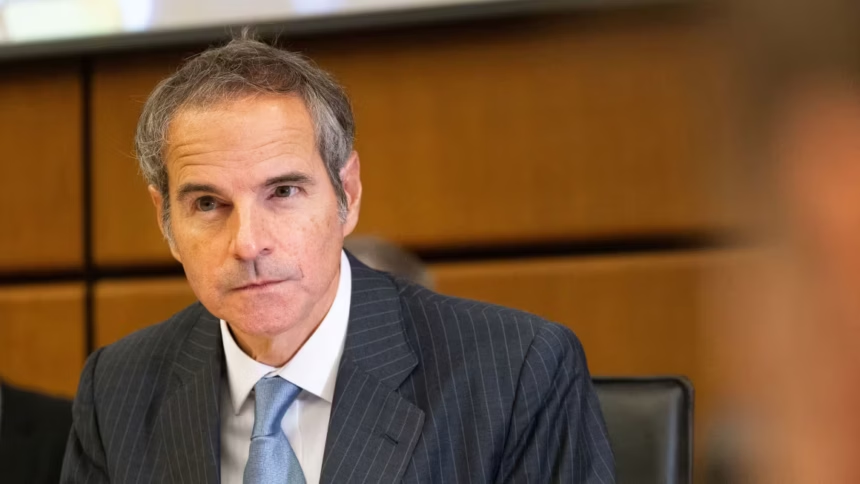The head of the UN’s nuclear watchdog has stated that the recent US strikes on Iran did not completely cripple its nuclear program, indicating that Tehran could resume uranium enrichment within months. This counters President Trump’s assertion that the US had significantly delayed Iran’s nuclear ambitions for years.
Rafael Grossi’s remarks align with early assessments from the Pentagon’s Defense Intelligence Agency, which suggested that while the US strikes targeted key Iranian facilities, they didn’t destroy the essential elements of the nuclear program and may have only postponed its progress by a few months.
Despite ongoing debates, Trump has consistently claimed that he has “completely and totally obliterated” Iran’s nuclear capabilities. Tensions escalated earlier this month when Israel initiated a significant offensive aimed at preventing Iran from developing a nuclear weapon, although Iran maintains that its nuclear efforts are for peaceful purposes.
Following this, the US targeted three vital Iranian nuclear sites before a ceasefire was established. The actual damage to Iran’s nuclear program remains a topic of intense discussion among experts.
More recently, US military officials have shared some insights on the planning of the strikes, but they have not provided new evidence confirming their impact on Iran’s nuclear infrastructure. After classified briefings this week, some Republican lawmakers have recognized that the US strikes likely did not neutralize all of Iran’s nuclear materials but emphasize that this goal was never stated as part of the military’s mission.
Additionally, The Washington Post reported that intercepted communications among senior Iranian officials revealed they found the attacks to be less devastating than expected.

Severe but not ‘total’ damage
In a recent interview with CBS’s “Face the Nation,” Rafael Grossi, director general of the International Atomic Energy Agency (IAEA), shared insights on Iran’s nuclear capabilities. He pointed out that the “hourglass approach” to assessing weapons of mass destruction is problematic.
Grossi emphasized that while significant damage has occurred, it is not complete. “The capacities they have are still in place. In just a matter of months, or even sooner, they could get centrifuges operational and start producing enriched uranium,” he stated. He insisted that it’s inaccurate to assert that all their capabilities have vanished.
“It’s evident there has been severe damage, but it’s not total. Iran possesses both industrial and technological capabilities, so they can resume these activities if they choose,” Grossi added.
During his discussion with CBS News, Grossi confirmed that the IAEA has remained cautious about declaring whether Iran has developed or is nearing nuclear weapons, despite external pressures. “We haven’t observed a program explicitly directed toward nuclear weapons, but Iran has left many critical questions unanswered,” he noted.
In response to Grossi’s remarks, a U.S. official referenced his earlier comments, highlighting the considerable damage sustained by Iran’s nuclear program due to Operation Midnight Hammer. The official asserted, “As Rafael Grossi stated just days ago, the difference between the state of Iran’s nuclear program before and after the operation is ‘night and day.’ A very serious level of damage has been done.”
The official went on to dismiss concerns about Iran’s ability to rebuild its nuclear weapons program, claiming that their lack of air defenses makes such a notion implausible. “As the President (Donald Trump) has made clear, Iran will never obtain a nuclear weapon,” the official emphasized.
Grossi also reiterated the importance of granting the IAEA access to Iran to evaluate its nuclear activities. He mentioned that while Iran had been forthcoming with information previously, particularly before the recent Israeli and U.S. strikes, there were still areas that lacked clarity.
“In this delicate matter concerning the number of centrifuges and the levels of material present, we had considerable insight,” he stated. “However, my concern lies with several ambiguities. For instance, we discovered traces of uranium in locations within Iran that are not typically listed as declared facilities. For years, we’ve been questioning why these traces of enriched uranium were found at certain sites, and we’ve simply not received credible explanations.” The Pentagon’s preliminary assessment suggested that Tehran might have relocated some enriched uranium before the strikes, but Trump has maintained that nothing was moved. “It seems reasonable to assume that when they announce protective measures, moving material could be part of that. Still, as I mentioned, we are uncertain about the current whereabouts of this material or if some of it may have been affected during those twelve days,” Grossi conveyed to Brennan. In the meantime, Tehran has taken steps to withdraw from international oversight of its nuclear program. Iran’s parliament has passed legislation to stop cooperation with the UN nuclear watchdog, and the Foreign Minister, Abbas Araghchi, has indicated that the country might reconsider its membership in the Non-Proliferation Treaty (NPT), which prevents signatory nations from developing nuclear weapons.


